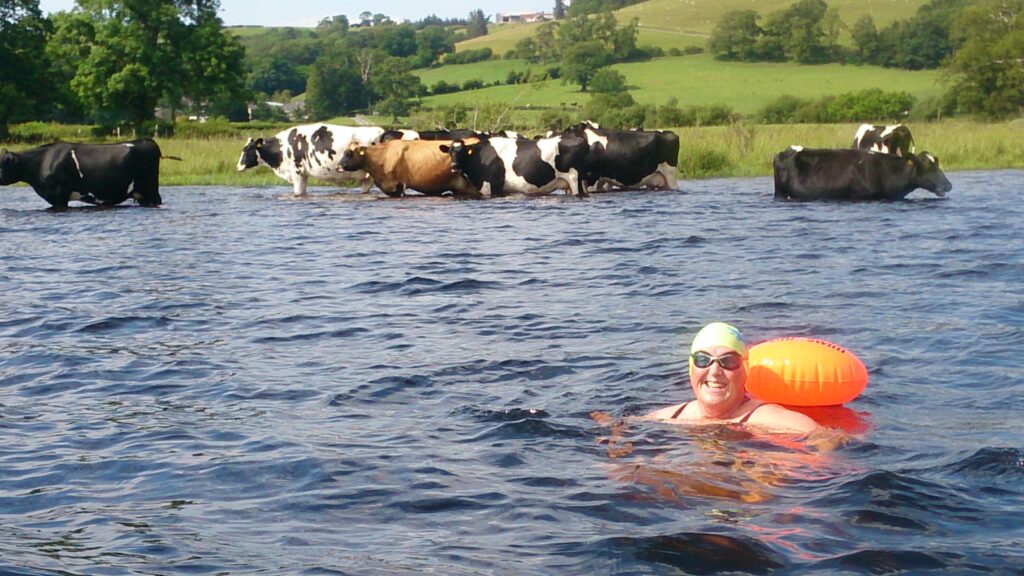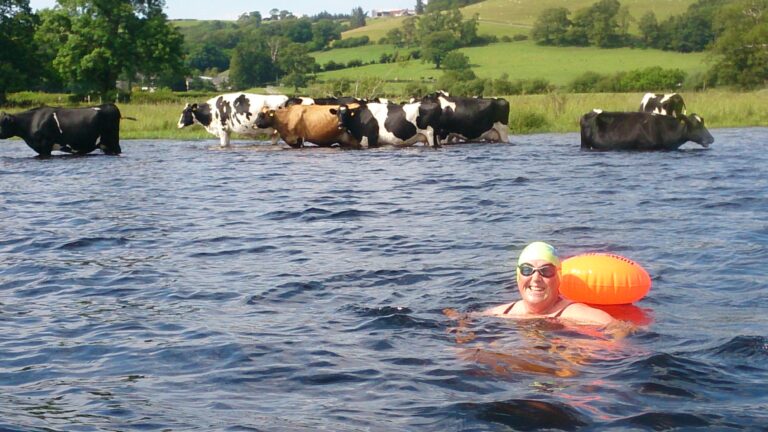The business of outdoor swimming
In the second of our interviews, we had the pleasure of speaking to the inimitable Rebecca Jarre. Owner of Triskeli Swims, Rebecca talks to us about how to approach outdoor swimming for the first time, its role in mental well-being and how her boxing and forensic psychologist careers led her to start her own micro business.

Most important question! Where does the name Triskeli come from?
I wanted an earthy symbol to represent earth, water, sky (the passion of outdoors swimming all in one) and to combine this with a Breton and Irish Celtic feel. So, the Celtic symbol triskelion was created by our designer.
Tell us a little bit about yourself…
I originally left school with very few qualifications, but decided to go to university where I studied genetics, psychology and computers. Having dyslexia wasn’t an easy route, I can assure you. Whilst studying hard, I spent most of my spare time in the gym kickboxing, going on to achieve the British title belt, I also did Thai boxing, and travelled across Europe for fights.
I was the first female heavy weight to fight on an all-female show in York Hall, London, which made history for female boxers in the UK. As a result, a model of me will be on display on a museum in the US! I’ve had many boxing fights, 58 in total and I went on to coach at Amir Khan’s gym, coaching female boxers.

What do new, interested swimmers need to know before they start swimming outdoors?
The most important thing to remember is safety and not to do it alone! There’s plenty of groups out there who will help any new swimmers. If all else fails, sit and watch from the bank and watch more experienced swimmers to see how they operate and the precautions they take. Looking at the entry and exit of the body of water you are viewing from.
Secondly, don’t push your limits until you have taken a lot of time to learn what they are, try not to get carried away with the psychology around groups, as in, one swimmer can stay in longer than another swimmer. Don’t let this become a mental maggot in your thought process as you may end up staying in the water too long which could lead to various emergency dangers. The water will be there tomorrow, so make sure you are. Swim in your depth, stay within two meters from the side and get out before you have done too much.
For the sake of paying up to £30 per session, please go along and find an open water coach near you and have an introduction to open water swimming sessions. This way you will have received professional information rather than a swimmer’s own personal experiences and what worked for them, after all, this may not work for you. It’s important to understand how your body will function in any water (10c and upwards) or below 10c if you choose to swim in the winter season, making sure you understand topics around cold water shock, cold water incapacitation and hypothermia from an authentic research paper or governing body.
How did you become involved in open water swimming and what inspired you to help others access its benefits?
During the last couple of years, swimming in the winter months has really boomed with complete beginners starting when the water temperatures are under 10c. Based on this, I wanted to offer a really affordable and ability-friendly way for as many people to get involved as possible. I provided at least two free introductions to open water swimming sessions via Triskeli Swims in a year for unemployed or people on a low income. I also deliver quite a few one-to-one and group ‘paid for’ sessions.
How did the lockdown restrictions impact your company and how did you mitigate them?
I had a lot of clients with mental health issues during lockdown who wanted one-to-one private sessions with me. This made me realise how many people crave support via open water and led me to design various projects including mindfulness swims. I hope to train and deliver these with various coaches within the UK.
Are any specialist skills or equipment needed for outdoor swimming?
The main items people need are: goggles, a bright swim cap, ear plugs, tow float, neoprene socks and gloves and a wetsuit/swimwear. In addition, you will need a dry robe, warm clothes and a hot flask, along with a mobile phone with a good reception.

What is missing in the messages about outdoor swimming? What are the misconceptions about cold-water swimming?
When there are too many opinions, people can pick up bad habits, which can put you in a more vulnerable position if you are a first-timer. Cold water incapacitation is something you need really to be careful of. If you’re in for too long, you can’t move your arms which is of course, extremely dangerous. Everyone will experience a degree of cold-water shock when they first enter the water. Knowing the danger around hypothermia and after shock is vital.
What have been the highlights of your experiences as an open-water swimming practitioner?
I’ve had so many! I loved being invited by the Tunisian government to take part in the swim of peace and it’s great to be named the second female in England to complete an Ice mile (non-registered one as I was too poor to pay for a qualified one!) Putting together the Caledonian Canal swim (60 miles) to raise funds for a charity was also an achievement and swimming with pilot whales in the Hebrides and swimming the deepest loch in Europe are memories I won’t forget. Also, swimming the biggest lake in Brittany and the highest lake in the UK. I have also put together many social swims, including ones of the highest beach in England.

I have to say though that helping and saving people’s lives via swimming is the most rewarding and I get a massive boost out of seeing people happy when they first do an open water swim with me.
If you’d like to know more about outdoor swimming, please get in touch with Rebecca via her website.
Click here to read our previous small business interview.

